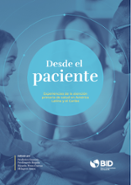From the Patient’s Perspective: Experiences with Primary Health Care in Latin America and the Caribbean
Date issued
Aug 2018
Data
Subject
Health;
Primary Health Care;
Health Care System
JEL code
I13 - Health Insurance, Public and Private;
I18 - Government Policy • Regulation • Public Health;
I1 - Health;
I11 - Analysis of Health Care Markets;
I14 - Health and Inequality
Country
Colombia;
Brazil;
Mexico;
Jamaica;
Panama;
El Salvador
Category
Books
Most countries in Latin America and the Caribbean (LAC) seek to reform their health systems so they can achieve universal coverage and improve health expenditure efficiency, while meeting citizens’ ever-growing expectations about the quality of care. The role of primary health care (PHC) stands out as key to achieving these objectives in an integrated manner.
With the aim of contributing to the design of evidence-based health policies in LAC, and giving special consideration to patient or health service user perspectives, between 2012 and 2014 the Inter-American Development Bank carried out the Primary Care Access, Experience and Coordination Survey in Latin America and the Caribbean, in adult populations in Colombia, Mexico, Brazil, El Salvador, Panama and Jamaica.
The first two chapters of this book present the context and challenges of health systems in the region and describe the conceptual framework and methodology of the study. Chapters three through eight cover, separately, each of the six countries studied, presenting results on patients’ experiences with primary health care and its integration with other levels of care. Chapter nine concludes the book with a comparative analysis among the six LAC countries, and extends the comparison to 11 high-income OECD countries, showing persistent gaps in indicators regarding access, experience, and coordination in PHC between LAC and OECD countries. A multivariate analysis of these 17 countries shows that the main attributes observed in PHC are directly linked to patients’ perceptions on the need for fundamental changes in health systems and the quality of the services they use.
With the aim of contributing to the design of evidence-based health policies in LAC, and giving special consideration to patient or health service user perspectives, between 2012 and 2014 the Inter-American Development Bank carried out the Primary Care Access, Experience and Coordination Survey in Latin America and the Caribbean, in adult populations in Colombia, Mexico, Brazil, El Salvador, Panama and Jamaica.
The first two chapters of this book present the context and challenges of health systems in the region and describe the conceptual framework and methodology of the study. Chapters three through eight cover, separately, each of the six countries studied, presenting results on patients’ experiences with primary health care and its integration with other levels of care. Chapter nine concludes the book with a comparative analysis among the six LAC countries, and extends the comparison to 11 high-income OECD countries, showing persistent gaps in indicators regarding access, experience, and coordination in PHC between LAC and OECD countries. A multivariate analysis of these 17 countries shows that the main attributes observed in PHC are directly linked to patients’ perceptions on the need for fundamental changes in health systems and the quality of the services they use.
Generative AI enabled




